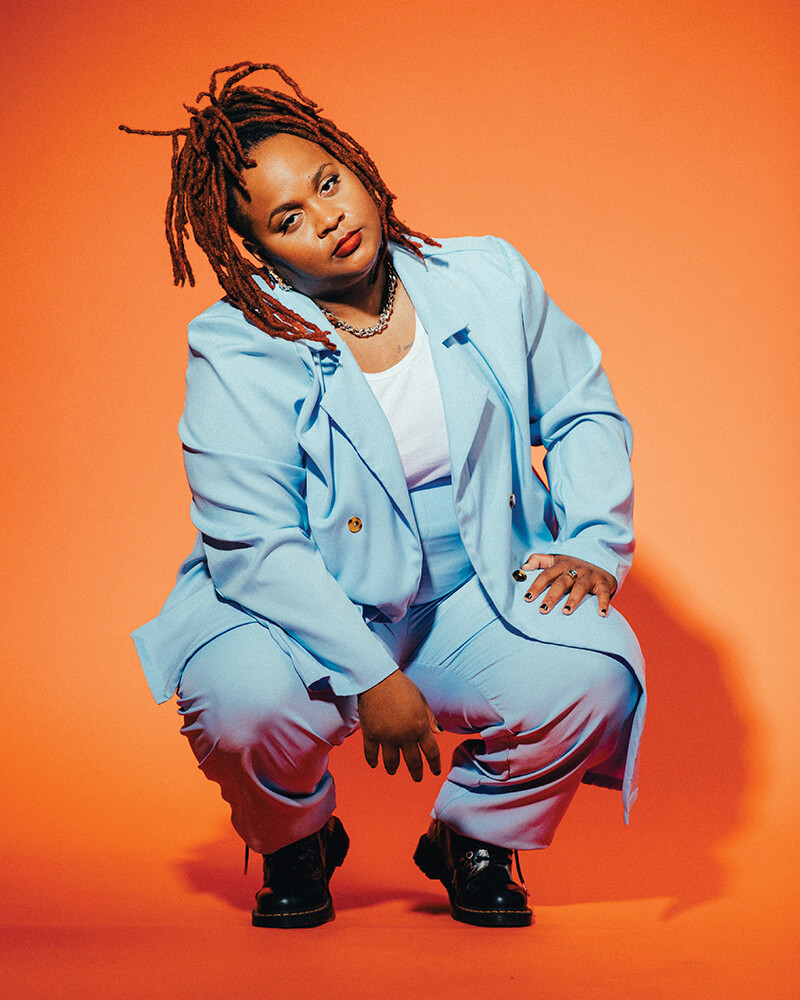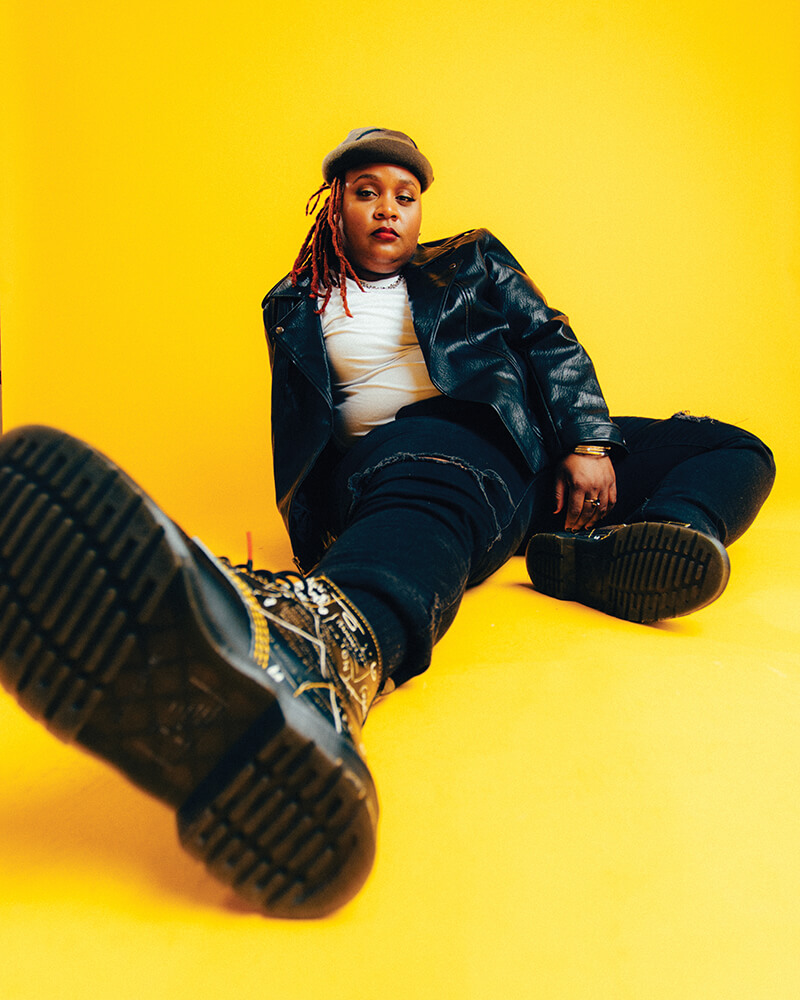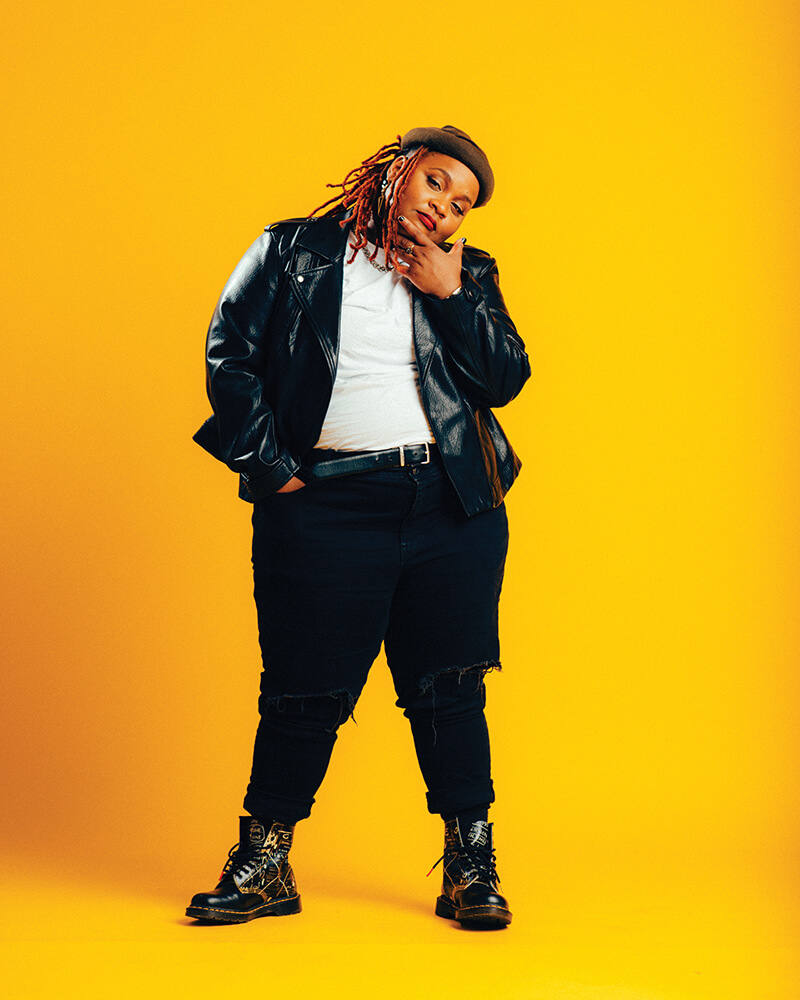Boston-based hip-hop and spoken word artist Oompa wears many hats: lyricist, poet, creator, activist, and visionary are just a handful I learned when speaking with her. Her music, like everything Oompa does and embodies, is borne of intentionality and a deep understanding of the human condition.
Her name is a statement for reclaiming one’s body and taking up space: “The guys on the court called me that as an endearing term, but it heightened my visibility, the visibility of my body in a certain way as a bigger body. And I wasn’t comfortable with that at the time, but I was like, ‘How do I own this body always?’ So I think Oompa is a reminder,” she asserts.
Oompa’s ethos? To forever represent the queer orphan, the Black kid, as noted in her bio. Growing up in Boston’s Roxbury neighborhood, Oompa lost her mom at the age of 18 and waded through traumatic times. Throughout her life, Oompa has maintained the inherent value of representation, and when you listen to her music, she hopes you feel held by it, too.

“I always verify that I see the humanity because I think oftentimes it can be in question, depending on the situation and the place, so I just want people to know that when they open the door to my music or my art that they have a place here…It’s not like I’m the first of anything like myself to exist or to make art or to be visible or to inspire, but I think there’s a certain way that I just want to continue to tell people that I love who are experiencing life and trying to find joy and trying to be in this world, even with all of these different identities and experiences, I just want them to know I see them. So yeah, that’s what it means when it says I represent. I got your back, and I see you.”
From her debut album to her second release Cleo, Oompa can see how she has expanded as both an artist and a human being by processing traumatic wounds: “The music that I’ve made up until “Closer”…I had so much hurt and so much pain and so much desire to be seen and held inside of me around the loss of my mother and how that experience was shaped by being Black and being poor and being from Roxbury. And also how my housing was limited based on being queer and Black and just so many different things shaped my experience.”
Oompa continues, “I think the promise of a future is what I wanted to offer that character [Cleo] as she was a representation for me of who I am and who I could be, but also whatever I am to other people. I wanted to offer myself a future, as well, and so I think that Cleo in some ways for me created a portal, but I wasn’t quite yet ready to walk through that door, both in my life but also in my music.”

Today, Oompa’s music speaks to the liberation of oneself, the ability to liberate those around you and, ultimately, the ways human beings can heal. Our interview quickly went beyond the surface level, as Oompa pondered many of life’s existential questions. That’s just who she is—incisive, thoughtful, and looking past what is, to discover what could beand what beautiful futures are possible.
“The music that I’m making now is the music that comes after that [portal…but what does it look like to be at peace? What does it look like to go through my healing journey? I’m in therapy now, I’m finding spirit, I’m taking care of plants, I got a morning routine, I run now…What does it look like to have a life worth living at this point? And there will be sadness, and there is sadness, but how do I capture the promise of this life? Because it’s one thing to make the art that people feel when they want to feel bad or they want to relate or they want to understand, or they just want to know what I’ve been through, but for the kids who latched onto that music because they feel so alone in the world or they feel hopeless, I feel a need for myself and for them to go through that portal now and see what’s in there for us, and to say, ‘Hey man, shit is rough, but I’m here. I’m here, and you could be here, and you could stay here, and life could be a joyous occasion,’” Oompa says through a smile.
Oompa’s newest release, “Closer,” presents us with a dichotomy; on one hand, the song is an absolute jam, and on the other, the lyrics stop you in your tracks. The video has the same effect. It’s in this deliberate curation where Oompa’s music finds its power—each lyric is moving, each note evokes emotion. What Oompa wants people to know about it? While Black Lives Matter is a motif within the video, it’s not the theme.
To Oompa, Black Lives Matter is an inherent statement and also just one step toward an anti-racist society, not the whole staircase.
“Part of the video is in response to the emergence of Black Lives Matter … Outside of the pandemic, I’m still getting these questions of, ‘What do you have to say?’ And my response is my slap in the face to oppression at this particular point in time: it’s to be in love, it’s to love the people around me, it’s to take care of my mind. Because how can I really think about what it means to be a part of the movement of Black liberation if I’m not even taking care of the Black person I’m most responsible for? And the person whose life I’m most responsible for enriching?”

She goes on to say, “If it’s time to be a part of the movement, if it’s time for the upheaval and the unrest, I can be here for that, but let it be for the right moment or the big moment or something that moves me to move in this way, and in the meantime, my form of protest is being alive and being well and being happy.”
Being in the Boston music scene, which Oompa describes as scrappy, she is able to create in a way that she wouldn’t be able to in major music cities of New York or L.A., like hosting shows in living rooms when the venue says no (the latter later realizing their misstep) and forming a tight-knit community. New music and shows are definitely on the horizon for Oompa, but for right now? She’s making sure awareness and love are her top focus.
“Right now if I’m gonna be here, if I’m gonna maintain my sanity and whatever is expected at this point, I need to be well. I need to heal. I need to find a way to be present. I need to see what is around me to take in. For me it was love, that’s the only thing. Awareness and love. I want it to always come from there,” she says.

